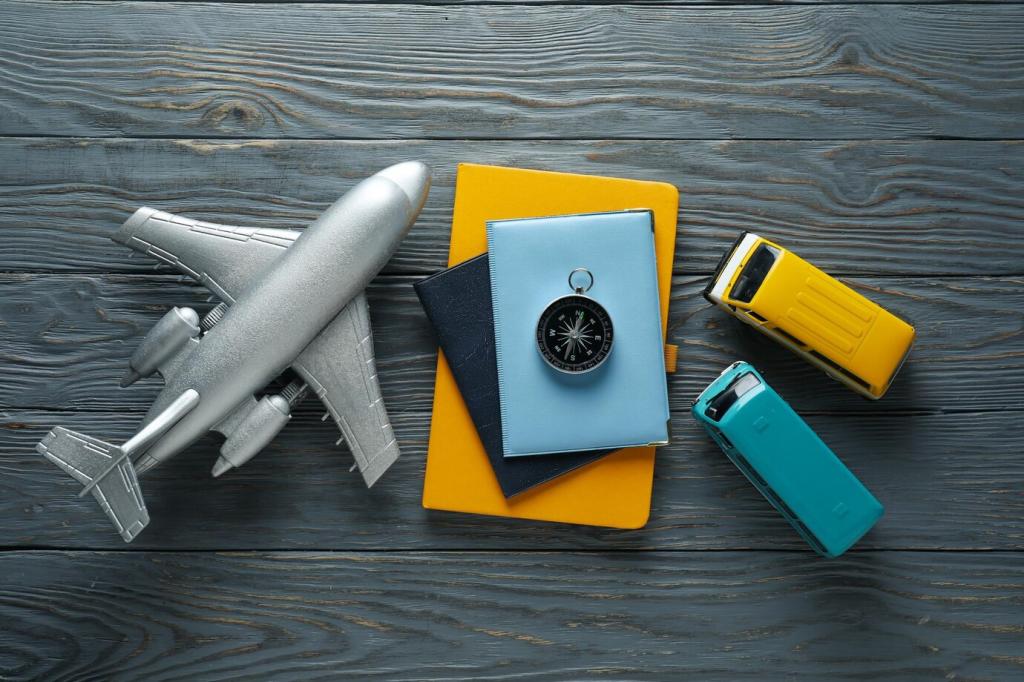The Future of Travel: Cutting-Edge Tech Innovations
Travel is being revolutionized at breakneck speed, thanks to advances in technology that are transforming how we move, explore, and experience the world. From automation and artificial intelligence to sustainable solutions and immersive experiences, new tech innovations are reshaping everything from the booking process to how we journey across continents. This page explores the future of travel by delving into the most exciting, transformative technologies that will define our coming adventures.

Smart Connectivity and the Internet of Things
Connected Travel Ecosystems
Travelers now expect a digital ecosystem that connects their transportation, accommodation, and activities. Smart hotels, airports, and public transit systems employ IoT sensors and platforms to sync services in real time. This not only helps prevent disruptions but also anticipates traveler needs—everything from room temperature preferences to pre-suggested local experiences. As IoT expands, such connectivity turns travel into a more fluid and less stressful adventure.
Luggage Tracking and Smart Bags
Lost baggage is a traveler’s nightmare, but IoT-enabled luggage offers a solution. Smart suitcases come equipped with GPS trackers, proximity alerts, built-in scales, and even remote lock controls. These features empower travelers to track their bags through apps, receive notifications if luggage gets misplaced, and ensure belongings remain secure. With these innovations, the journey becomes more reassuring and efficient, reducing one of travel’s traditional pain points.
Personalized In-Transit Services
Whether on a plane, train, or cruise ship, IoT fosters a deeply personalized journey. Airlines harness connected devices to monitor passenger preferences, from meal choices to entertainment. Transit hubs relay real-time updates and adjustment options for layovers or delays, while geofenced services greet travelers as they arrive at new destinations. In-transit comfort is being thoroughly reimagined with tailored experiences driven by interconnected data.
Artificial Intelligence Transforming Travel Experience
Gone are the days of generic travel itineraries. AI-driven virtual assistants and chatbots now offer dynamic, tailored planning based on a traveler’s preferences, history, and even real-time conditions such as weather or events. They monitor price fluctuations, recommend updates, and book reservations—all while learning individual habits. This rapidly evolving intelligence delivers convenience and relevance with every suggestion, making trip planning far more engaging and intuitive.
Language barriers are quickly crumbling thanks to AI-powered, real-time translation tools. Smart devices and travel apps can now interpret voice or text conversations instantly, making cross-cultural communication smoother and more inclusive. As these tools become more accurate, travelers can navigate foreign environments, read signs, and interact authentically with locals, enriching the overall travel experience.
AI technologies are fundamentally shifting how the travel industry provides customer service. Chatbots and automated helpdesks operate 24/7, handling everything from booking changes to lost item claims. Machine learning helps these systems continually improve, offering faster solutions and recognizing urgent issues that need human intervention. The result is more reliable, responsive support before, during, and after the journey.
Autonomous Transportation and Mobility Solutions

Self-Driving Cars and Shuttles
Urban and intercity travel are undergoing a transformation as self-driving vehicles become more prevalent. Autonomous taxis, shuttles, and rental cars use sophisticated sensors, AI, and networked data to transport passengers efficiently, reducing congestion and the risk of human error. For travelers, this means smoother, more accessible, and safer transit, especially in unfamiliar cities or regions where navigation can be challenging.

Urban Air Mobility
Flying taxis and drones are moving from the realm of science fiction into reality. Companies and cities are piloting electric, vertical takeoff and landing (eVTOL) aircraft to shuttle passengers across cities or hard-to-reach destinations. This type of urban air mobility has the potential to drastically cut travel time, bypass traditional traffic jams, and open up routes that were previously inaccessible, signaling a new age in speedy, futuristic urban exploration.

Hyperloop and High-Speed Rail
Ground transportation for long-distance travel is being reimagined with hyperloop systems and next-generation high-speed trains. Using magnetic levitation (maglev) and near-vacuum tubes, hyperloop promises to reduce hours-long journeys to mere minutes. Innovations in high-speed rail technology are connecting cities with unprecedented speed, safety, and sustainability, changing the way we think about regional and cross-country trips.

Virtual and Augmented Reality Enhancing Exploration
Planning a trip is easier and more inspiring with VR previews of destinations, hotels, or attractions. Travelers can take simulated tours to explore landmarks, check hotel interiors, or even walk city streets—all from their own homes. This immersive research aids decision-making, reduces uncertainty, and builds excitement, adding a virtual layer of engagement to the pre-travel stage.
Previous
Next
Contactless Travel and Biometric Security
Airports around the world are rolling out facial recognition, fingerprint scanning, and iris identification for passport control. These systems streamline immigration and boarding, slashing wait times and minimizing contact during processing. Advanced biometric algorithms deliver stringent security, making travel both high-tech and hassle-free while quickly verifying identities across borders.
Electric and Hybrid Transportation
Electric and hybrid vehicles are gaining ground on roads, rails, and in the skies. Airlines are experimenting with biofuels and electric planes, while rental fleets and public transit transition to greener alternatives. These advances are drastically reducing emissions, noise pollution, and reliance on fossil fuels, allowing travelers to explore with a lighter environmental impact.
Smart Energy Management in Hospitality
Hotels and resorts are integrating sensors, automation, and AI systems to minimize waste and optimize energy use. Features such as motion-sensing lights, climate control, and smart water management not only conserve resources but also enhance guest comfort. By leveraging technology, the hospitality sector is setting new standards for sustainability while improving operational efficiency.
Carbon Tracking and Offset Platforms
Travelers today can use digital tools to track their personal carbon footprint, receive recommendations for greener options, and invest in verified offset projects. Airlines and booking platforms provide transparent emissions information, enabling travelers to make informed environmental choices. Technology is making it easier than ever to adopt sustainable practices and participate in conservation efforts.
Health, Safety, and Wellness Innovations
Automated health checks are now common at airports and transportation hubs. Non-invasive temperature scanners, biometric symptom detection, and integrated health declaration apps allow for rapid assessments and real-time alerts. These technologies increase safety by identifying risks early, reducing the spread of illness and promoting healthier travel environments for all.
Previous
Next
The Rise of Travel Super Apps
Super apps allow users to search, reserve, and manage flights, accommodations, transport, activities, and dining—all in one hub. AI-driven suggestions and reviews offer personalized recommendations, while real-time notifications ensure travelers stay updated on gate changes, delays, or local events. This complete integration reduces app clutter and simplifies every step of the travel process.

Join our mailing list
